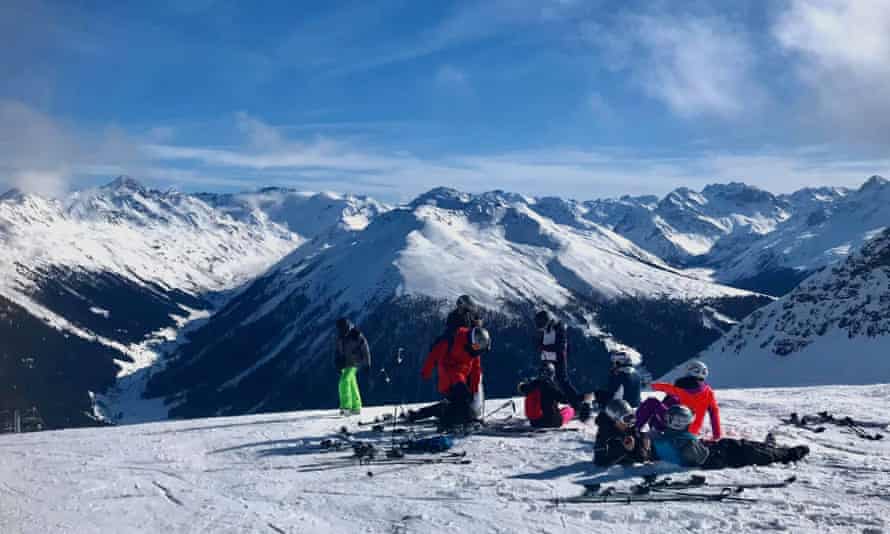
There were a couple of days on his most recent course, Andy Walters admits, “when I thought: ‘Am I too old for this?’ Then, the next day, I was fine. I was the oldest guy who passed, so that was gratifying.” He has just taken a further qualification as a ski instructor, reaching a level that enables him to teach almost anywhere, four years after embarking on this new direction at the age of 60.
Walters had always had a fascination with skiing, even though he was born in Kuwait, a place “as snowless as you can get”. His father was a civil engineer, his mother, a physiotherapist from the Isle of Bute, the Scottish island where Walters now lives. He and his wife moved there 25 years ago and bought a run-down hotel, which they run as a self-catered holiday house. They live in a flat alongside, handing over the keys to guests on a Friday, “so we’re sort of retired, and it gives me more time to do the things I want to do”.
It’s why Walters thought he might enjoy teaching people to ski. He had, after all, he says with a smile, enjoyed the breadmaking classes he used to run. “I like teaching people things,” he says.
When he was a child, Walters’s family moved back to the UK, and he first skied at 11 on a school trip to Austria. “We were allowed to go up the mountain on the second day and I remember, with a friend, being so scared of skiing down that we actually walked down,” he says. Yet it didn’t put him off. Their teacher started organising Sunday trips to Glenshee, the skiing area in the Highlands, and Walters became part of the school’s ski team (consisting of just him and another boy).
In his 20s, Walters moved to Brighton and worked as a computer programmer in London, while also working on Saturdays in a ski shop. He was offered a full-time job there, and decided to take it. Later, he and a friend worked as location caterers, largely for BBC productions. Between that and raising three daughters, Walters didn’t ski for about 20 years. “It wasn’t until we moved to Scotland and I was closer to some of the resorts that I picked it up again.”
Once he had taken the week-long instructor course in the Cairngorms – followed by further training – he wasn’t sure there would be an easy route into work. Then he spotted a plea on Facebook from a company that teaches children to ski, for someone to replace one of their instructors who had injured herself. Three days later, Walters arrived in Switzerland. “I was thinking: ‘This is going to be awful, because I’ll be this old guy,’” he says. But he wasn’t even the oldest instructor – there was one in his early 70s. It went so well that, by the second day, his group of 11- and 12-year-olds were skiing down easy runs. He now regularly works with the company, teaching groups of children during their school holidays.
He is pretty fit, he says, and being a 64-year-old ski instructor isn’t too tiring, although, he adds: “You can find yourself out of breath sometimes if you’re following a 20-year-old down a run and they refuse to stop. The thing about skiing is, if your technique is quite good, it’s fairly efficient, so you don’t tend to over-exert yourself.” There is “very little ageism”, he says, within the instructor world, where there is a diverse range of ages – on his recent course, the youngest was 16, and the oldest was in his 70s (although he didn’t finish it). When you’re teaching beginners “you spend most of your time dealing with people skiing fairly slowly. You’re not trying to teach people to go as fast as possible – you’re trying to teach them how to ski with control, reduce speed, get down the mountain without killing themselves.”
Three years ago, Walters broke his pelvis. “I had a sort of freak slip sideways and landed on my hipbone on a very hard piste, which was enough to put me in hospital for four days, and then on crutches for three months. When you get to your 60s, everything can be a potential problem, but I skied the next year and it was fine.”
He doesn’t think the accident – or its impact – was age-related, he was just unlucky.
“It’s knees that generally go first but, so far, fingers crossed …”
What has this change of life given him? “Great friends,” he says. “I’ve met a lot of really interesting people, and skied with them.” It has been fun to teach children, he says, and see them progress. “It’s something I didn’t anticipate I would do this late. I like to keep myself interested, and I think it keeps me feeling young.” Sometimes he compares himself with an instructor, 20 years his junior, who has become a good friend “and think maybe I should have done it at 40, but I didn’t have the confidence, I didn’t think I could actually achieve it. Then for some reason, four years ago, I thought: ‘Maybe I can.’”
Tell us: has your life taken a new direction after the age of 60?



